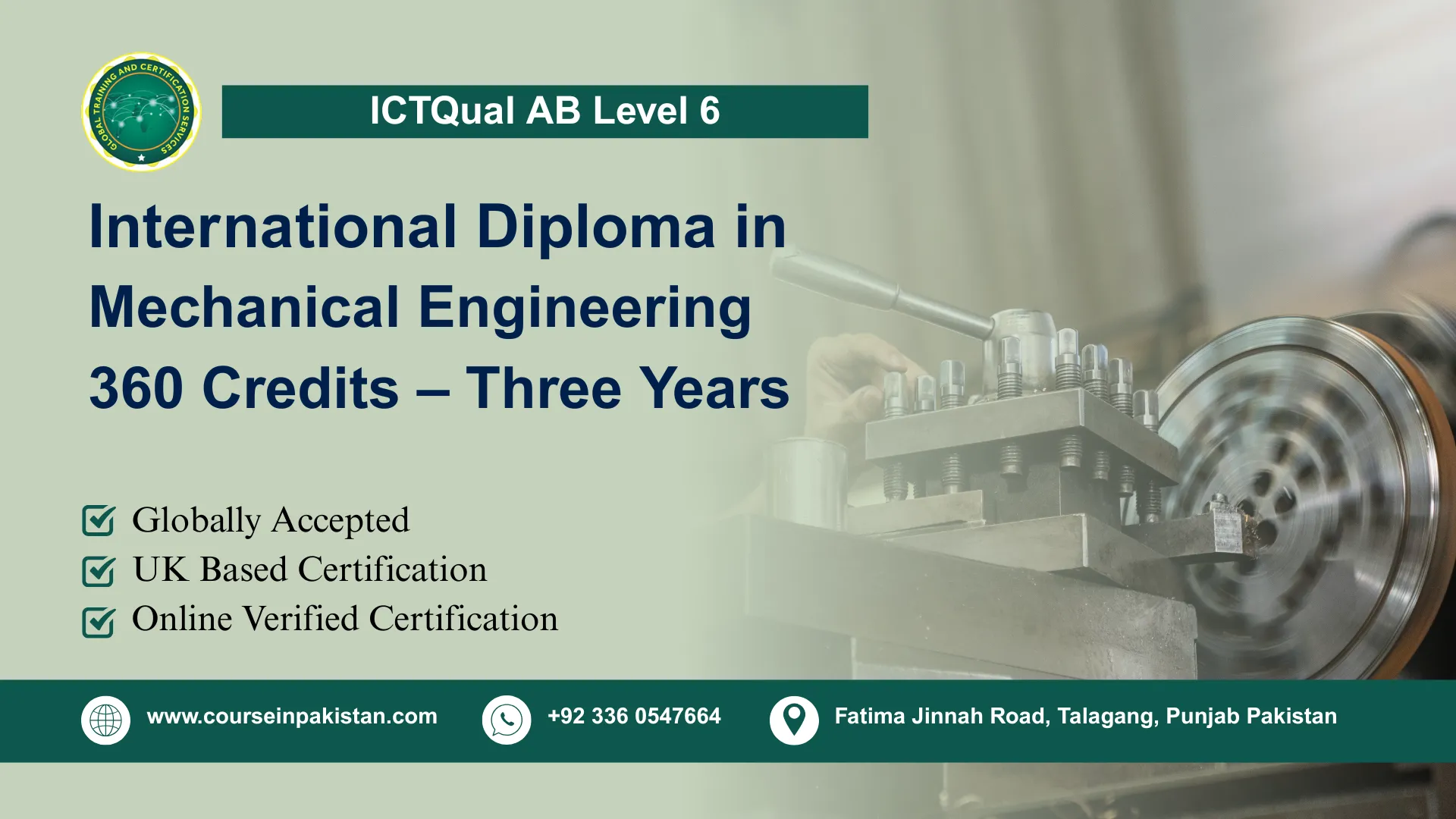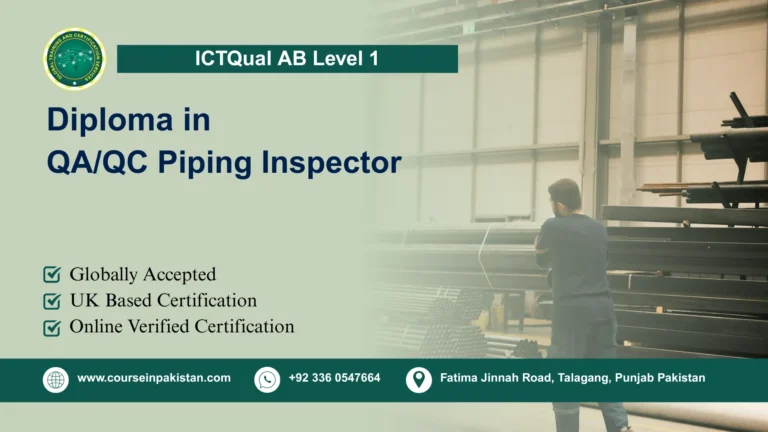
The ICTQual Level 6 Diploma in Mechanical Engineering 360 Credits – Three Years is a comprehensive, internationally recognized qualification designed for individuals aspiring to excel in mechanical engineering and related industries. This 360-credit program is fully assignment-based, allowing learners to study at their own pace from anywhere in the world. The course offers the flexibility for fresh graduates to gain an in-depth understanding of mechanical engineering fundamentals while enabling experienced professionals to validate their expertise through professional discussions with ICTQual AB Approved Assessors.
This diploma covers all aspects of mechanical engineering, from foundational principles to advanced technologies, including mechanical design, thermodynamics, manufacturing processes, automation, and industry 4.0 applications. Learners will develop practical, technical, and managerial skills required for careers in mechanical systems, manufacturing, energy, and industrial sectors. With British Council verification, MOFA and Embassy attestable certification, it is ideal for career growth, job placements, and iqama approval.
Course Overview
The ICTQual Level 6 Diploma in Mechanical Engineering is a 360-credit qualification delivered over three years through an entirely assignment-based system. Fresh students must complete all 36 mandatory assignments within 3 years, whereas experienced professionals with at least 6 years of verifiable relevant experience can achieve the qualification in a shorter period by defending their knowledge in professional discussions with ICTQual AB Approved Assessors, without completing all assignments. This flexible structure allows learners to gain a globally recognized diploma that is fully verifiable, MOFA and Embassy attested, and highly respected in the engineering industry for career progression and iqama approval.
The course curriculum combines theory, practical applications, and research methodologies to prepare learners for technical roles, leadership positions, and entrepreneurship opportunities in mechanical engineering, manufacturing, and industrial sectors. It emphasizes innovation, problem-solving, and sustainable engineering practices aligned with modern industry standards.
Key Highlights of the Course:
- Fully assignment-based 360-credit program with flexible study options.
- British Council verified, MOFA and Embassy attested certification.
- Suitable for fresh graduates and experienced professionals.
- Opportunity for faster completion for competent professionals through professional discussions.
- Focused on modern mechanical engineering applications, automation, and Industry 4.0.
Course Benefits
Comprehensive Knowledge and Skills
- Gain a strong foundation in mechanical engineering principles, thermodynamics, materials, and manufacturing processes.
- Learn advanced mechanical design, automation, robotics, and sustainable engineering techniques.
Career Advancement
- Enhance employability in mechanical, industrial, and manufacturing sectors.
- Prepare for leadership, project management, and specialized engineering roles.
Flexible Learning
- Complete assignments at your own pace from anywhere in the world.
- Experienced professionals can fast-track the certification by validating prior experience.
International Recognition
- British Council verifiable qualification.
- MOFA and Embassy attested for global and regional recognition.
Professional and Technical Development
- Develop research, problem-solving, and project management skills.
- Gain insights into Industry 4.0 technologies, automation, and smart manufacturing systems.
Course Study Units
This qualification, the ICTQual Level 6 Diploma in Mechanical Engineering 360 Credits – Three Years, consists of 36 mandatory units.
Year 1: Foundation and Core Engineering Principles
- Mathematics for Engineering
- Engineering Principles
- Materials Science and Engineering
- Engineering Drawing and CAD
- Statics and Dynamics
- Introduction to Thermodynamics
- Manufacturing Processes
- Fluid Mechanics
- Electrical and Electronic Systems for Engineers
- Engineering Mathematics for Design
- Mechanical Design Fundamentals
- Engineering Project Management
Year 2: Advanced Engineering Concepts and Applications
- Advanced Thermodynamics
- Strength of Materials
- Heat Transfer and Fluid Dynamics
- Advanced Manufacturing Techniques
- Mechanical Vibrations and Acoustics
- Engineering Dynamics and Control
- Design and Analysis of Machine Elements
- Control Systems for Mechanical Engineering
- Engineering Materials and Failure Analysis
- Computer-Aided Engineering (CAE)
- Mechanical System Design
- Project Planning and Cost Estimation
Year 3: Specialization and Practical Application
- Advanced Mechanical System Design
- Energy Systems and Sustainability
- Advanced CAD and 3D Modeling
- Finite Element Analysis (FEA) for Mechanical Engineers
- Advanced Manufacturing and Robotics
- Mechatronics and Automation
- Engineering Research Methodology
- Industrial Engineering and Process Optimization
- Design for Manufacturability
- Professional Practice in Mechanical Engineering
- Engineering Innovation and Entrepreneurship
- Capstone Project/Thesis
Learning Outcomes
Year 1: Foundation and Core Engineering Principles
Mathematics for Engineering
- Apply advanced mathematical concepts to solve engineering problems.
- Use calculus, algebra, and differential equations in mechanical engineering contexts.
Engineering Principles
- Understand fundamental concepts in mechanics, energy, and material behavior.
- Apply engineering principles to basic design and problem-solving scenarios.
Materials Science and Engineering
- Identify and evaluate properties of engineering materials for mechanical applications.
- Understand material selection criteria for strength, durability, and performance.
Engineering Drawing and CAD
- Develop technical drawings and 3D models using CAD software.
- Interpret and create engineering schematics and blueprints accurately.
Statics and Dynamics
- Analyze forces, moments, and motion in mechanical systems.
- Apply principles of equilibrium and motion to solve mechanical problems.
Introduction to Thermodynamics
- Understand laws of thermodynamics and energy transformations.
- Apply basic thermodynamic principles to engineering systems and processes.
Manufacturing Processes
- Understand conventional and modern manufacturing techniques.
- Evaluate production methods based on efficiency, quality, and cost.
Fluid Mechanics
- Analyze fluid properties and flow behavior in engineering systems.
- Apply fluid mechanics principles to practical mechanical engineering problems.
Electrical and Electronic Systems for Engineers
- Understand basic electrical circuits and electronic devices.
- Apply electrical principles in mechanical systems and automation.
Engineering Mathematics for Design
- Use mathematical tools for engineering modeling and analysis.
- Solve design-related mathematical problems for mechanical components.
Mechanical Design Fundamentals
- Apply design principles to simple mechanical components.
- Understand factors influencing mechanical system performance.
Engineering Project Management
- Plan and manage engineering projects effectively.
- Apply basic project management techniques, including scheduling and resource allocation.
Year 2: Advanced Engineering Concepts and Applications
Advanced Thermodynamics
- Analyze complex energy systems using thermodynamic laws.
- Design thermodynamic solutions for power and refrigeration systems.
Strength of Materials
- Evaluate stress, strain, and deformation in mechanical components.
- Apply material strength concepts to structural and mechanical design.
Heat Transfer and Fluid Dynamics
- Solve practical problems involving conduction, convection, and radiation.
- Analyze fluid flow and heat exchange in engineering systems.
Advanced Manufacturing Techniques
- Understand CNC, additive manufacturing, and advanced machining processes.
- Select appropriate manufacturing methods for complex mechanical parts.
Mechanical Vibrations and Acoustics
- Analyze vibration characteristics of mechanical systems.
- Apply acoustic principles to reduce noise and improve performance.
Engineering Dynamics and Control
- Study motion and forces in dynamic mechanical systems.
- Apply control theory to manage system responses and stability.
Design and Analysis of Machine Elements
- Design gears, shafts, bearings, and other mechanical elements.
- Analyze mechanical performance under various load conditions.
Control Systems for Mechanical Engineering
- Understand feedback, sensors, and actuators in mechanical systems.
- Apply control principles to automation and process control.
Engineering Materials and Failure Analysis
- Identify failure mechanisms in engineering materials.
- Apply knowledge to enhance material selection and durability.
Computer-Aided Engineering (CAE)
- Utilize CAE tools for simulation and analysis of mechanical systems.
- Optimize design performance using computational modeling.
Mechanical System Design
- Integrate components into functional mechanical systems.
- Ensure design meets operational, safety, and performance criteria.
Project Planning and Cost Estimation
- Prepare detailed plans and budgets for engineering projects.
- Evaluate project feasibility and resource requirements.
Year 3: Specialization and Practical Application
Advanced Mechanical System Design
- Design complex mechanical systems with multi-component integration.
- Apply advanced engineering principles to optimize system performance.
Energy Systems and Sustainability
- Analyze conventional and renewable energy systems.
- Apply sustainable engineering practices in energy design.
Advanced CAD and 3D Modeling
- Create intricate 3D models for complex mechanical components.
- Simulate and evaluate designs before production.
Finite Element Analysis (FEA) for Mechanical Engineers
- Perform stress, strain, and thermal analysis using FEA tools.
- Evaluate mechanical system reliability and safety using simulation.
Advanced Manufacturing and Robotics
- Understand robotics applications in modern manufacturing.
- Integrate automation to optimize production processes.
Mechatronics and Automation
- Apply principles of mechanical, electrical, and control systems integration.
- Design automated systems for industrial and engineering applications.
Engineering Research Methodology
- Conduct research using engineering methods and data analysis.
- Prepare and present technical reports based on evidence.
Industrial Engineering and Process Optimization
- Analyze manufacturing processes for efficiency improvement.
- Implement optimization techniques in industrial systems.
Design for Manufacturability
- Ensure product designs are practical for manufacturing.
- Evaluate cost, material, and production feasibility in designs.
Professional Practice in Mechanical Engineering
- Apply professional ethics and standards in engineering projects.
- Understand legal, safety, and regulatory requirements in engineering practice.
Engineering Innovation and Entrepreneurship
- Develop innovative solutions and engineering business ideas.
- Apply entrepreneurial principles to engineering projects and startups.
Capstone Project/Thesis
- Integrate knowledge from all units into a comprehensive project.
- Demonstrate problem-solving, design, and analytical skills in a real-world scenario.
Who is This Course For?
Aspiring Mechanical Engineers
- Individuals aiming to build a career in mechanical design, manufacturing, and industrial engineering.
- Fresh graduates who want a globally recognized qualification in mechanical engineering.
Experienced Professionals
- Practicing engineers seeking to validate their skills with an internationally recognized diploma.
- Professionals with at least 6 years of relevant experience who want accelerated certification through professional discussion.
Technical Innovators
- Learners interested in robotics, automation, and mechatronics integration.
- Individuals aiming to work in advanced manufacturing, energy systems, or research and development.
Entrepreneurial and Leadership Focused Learners
- Those planning to start engineering ventures or lead projects in mechanical and industrial sectors.
- Learners who want skills in project management, process optimization, and engineering innovation.
Future Progression
- Progress to senior mechanical engineer roles or project management positions in industrial and manufacturing sectors.
- Advance into specialized fields such as robotics, automation, mechatronics, or energy systems.
- Pursue further studies, including Level 7 Diplomas or Master’s programs in Mechanical or Industrial Engineering.
- Opportunity to work internationally in high-demand mechanical engineering and industrial sectors.
- Develop entrepreneurial pathways by establishing engineering consultancy or manufacturing ventures.
Academic Pathways:
- Progression to Level 7 Diploma in Mechanical Engineering or Advanced Engineering Management.
- Entry to specialized Master’s programs in Mechanical, Industrial, or Manufacturing Engineering.
- Professional certification and chartered engineer registration pathways in mechanical and industrial engineering bodies.
- Integration with vocational training and practical industrial apprenticeship programs for enhanced technical expertise.
Conclusion
The ICTQual Level 6 Diploma in Mechanical Engineering equips learners with comprehensive theoretical knowledge and practical skills across mechanical, manufacturing, and industrial engineering domains. This flexible, assignment-based program allows learners to study at their own pace from anywhere in the world while achieving a globally recognized, MOFA and Embassy attested qualification. Fresh students gain structured, in-depth exposure to core engineering principles, while experienced professionals can leverage their prior experience for faster certification. Graduates will emerge fully prepared to excel in mechanical engineering careers, advanced research, project management, or entrepreneurial ventures, making this diploma a pivotal step toward professional excellence.






